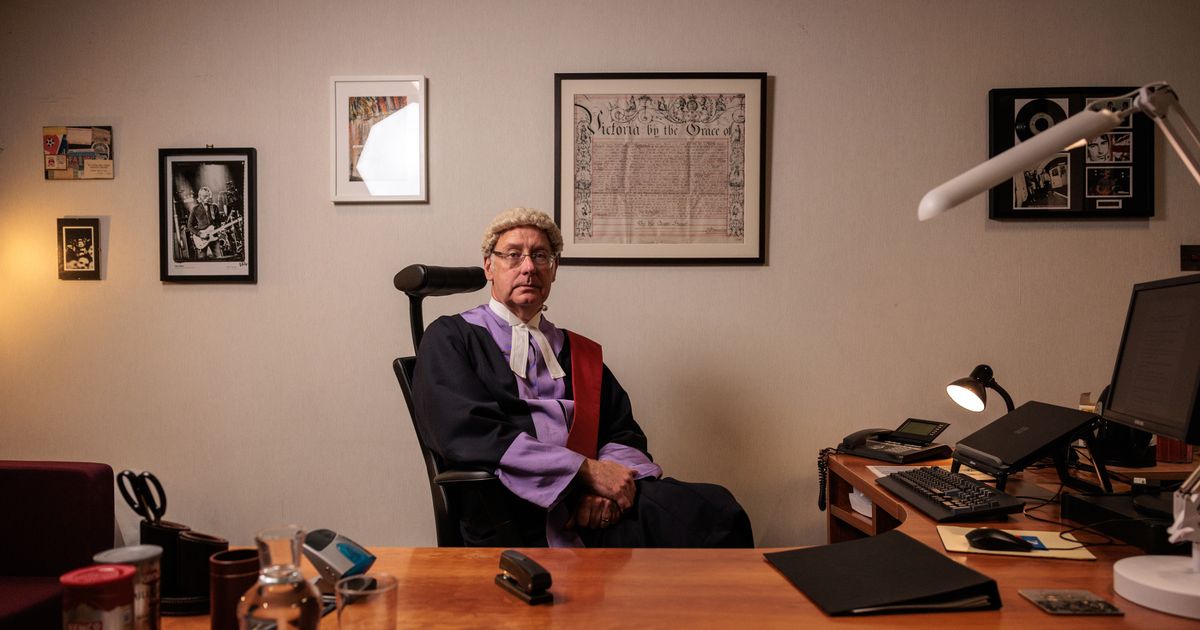“I say to young people that if they wish to come into law and if they are prepared to work hard, and that is a dream they wish to follow, they should be given every single encouragement to do so”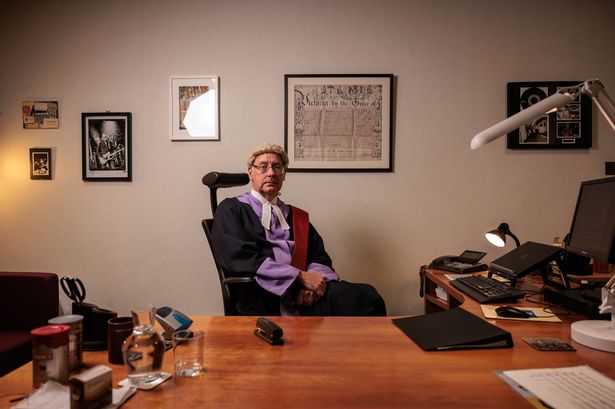 Judge John Potter reflects on his thirty nine year legal career, as he begins his retirement(Image: Kenny Brown | Manchester Evening News)
Judge John Potter reflects on his thirty nine year legal career, as he begins his retirement(Image: Kenny Brown | Manchester Evening News)
It is with ‘some regret’ that one of Manchester’s most senior judges, Judge John Potter, has hung up his wig and robes.
After the last 30 plus years in the legal sector, Judge Potter accepts that now the ‘time feels right’ as he embarks on the next chapter of his life.
In an interview with the Manchester Evening News, the senior judge, who had presided across both of Manchester’s Crown courts, has looked back on his career and what the future holds for the criminal justice system.
He began his legal career studying law in Nottingham Trent Polytechnic, before working a short time in London. Moving up north, he trained as a solicitor with Manchester firm, Platt Halpern.
Join our Court and Crime WhatsApp group HERE
Judge Potter then became a partner of the practice in 1992 before working as a police station duty solicitor throughout Greater Manchester.
After a 23-year career as a solicitor, he took the next step onto the Circuit bench. He was appointed at Bradford Crown Court in 2010 before moving to Manchester’s Minshull Street Crown Court where he was appointed resident judge.
Remaining there for the maximum eight-year term, he moved to Manchester Crown Square, near Spinningfields – where he has presided ever since.
“I do a full range of criminal work; terrorist cases, murder cases, serious sexual offense cases, and I have also had the very great privilege of sitting in the Court of Appeal Criminal Division from 2018 to 2024 on a part-time basis, dealing with matters of appeal within that jurisdiction,” he said.
As a senior judge within Manchester, Judge Potter has presided over some of the city’s most serious criminal cases – including scores of murder and serious sex offence cases.
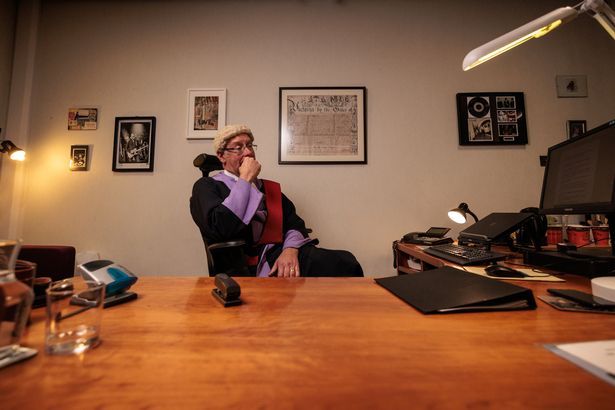 Judge John Potter reflects on his thirty nine year legal career, as he begins his retirement(Image: Kenny Brown | Manchester Evening News)
Judge John Potter reflects on his thirty nine year legal career, as he begins his retirement(Image: Kenny Brown | Manchester Evening News)
They included most recently, Jamie Rothwell, a gang boss who orchestrated a shooting in Warrington before fleeing to Spain. He was locked up for 43 years.
Other defendants include former TV weatherman Fred Talbot who was convicted of a string of sex offences against schoolboys over 35 years ago; and Ming Jiang who brutally murdered his friend then dumped his dismembered body in a suitcase.
The judge said that each case requires preparation ‘at the highest possible level’.
He said: “I think you have to approach the management of any case with appropriate preparation and the first port of call for me would be to prepare as astutiously as I could to ensure that the trial process, or the sentencing process, is as fair and appropriate as it possibly could be.”
Speaking about the impact of COVID, and the court’s response in the form of Nightingale Courts, the judge said there was a backlog that has built up. Judge Potter, who ran the Lowry Nightingale Court, said of the build up: “That’s built up partly because of underinvestment as well, from a variety of different governments and partly because of the caseload that the Crown Courts are now asked to deal with.
“We live in difficult and challenging times in the criminal justice system. But it’s no good simply ignoring those difficult challenges that the system now causes us to confront.
“I’m confident that with appropriate investment and with the will of professionals who work within the criminal justice system from each of the different agencies, we can work together to reduce the backlog and provide a more efficient service than we currently are.”
Of his role, he said it is a position of ‘very significant responsibility and privilege’.
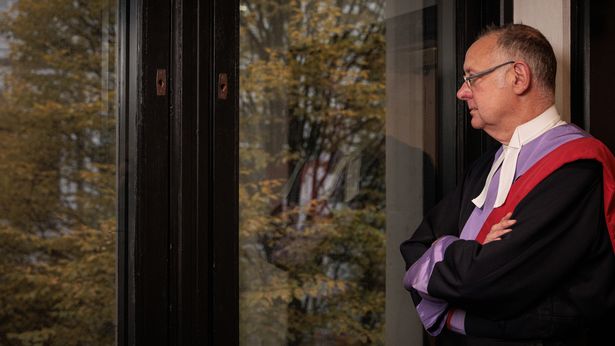 Judge John Potter reflects on his thirty nine year legal career, as he begins his retirement(Image: Kenny Brown | Manchester Evening News)
Judge John Potter reflects on his thirty nine year legal career, as he begins his retirement(Image: Kenny Brown | Manchester Evening News)
“I would say that certainly a few times a year over the last 16 years, I’ve been able to come out of court and thought to myself, ‘well I did make a real difference there’, I hope for the better, for a person connected to the criminal justice system, in particular, of course, a victim of serious abuse for example,” he said.
“But it isn’t really about whether I am pleased or sad about what I have done. I’ve always tried to work as hard as I could and do the best that I can and if that does result in a positive experience for somebody else who has been brought into the criminal justice often without wishing to be here, then good.”
A married father-of-two, Judge Potter plans to sort out ‘quite a lot of years worth of detritus’ in his South Manchester home.
“I do genuinely look forward to doing that. I’m very grateful to have good health and the opportunity to spend more time with my wife, my family and my friends.”
A few days before retiring, three students came in to observe the hearings before Judge Potter. Once they had concluded, the judge asked for the court to be cleared before removing his wig and speaking to them.
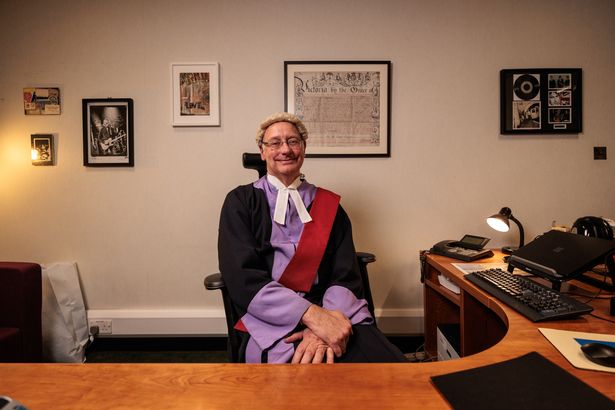 Judge John Potter reflects on his thirty nine year legal career, as he begins his retirement(Image: Kenny Brown | Manchester Evening News)
Judge John Potter reflects on his thirty nine year legal career, as he begins his retirement(Image: Kenny Brown | Manchester Evening News)
Asked about this, he said: “I think it’s extremely important that young people are encouraged to come into the legal profession. Young people from all sorts of different backgrounds, all sorts of different areas of our community, as diverse an entry as possible, because our community can only benefit from diversity and can only improve as a result.
“Young people are frequently discouraged from coming into law on the basis that the opportunities for them to advance with a career in law, as lucky as my career has been, is very limited.
“I take a different view. I say to young people that if they wish to come into law and if they are prepared to work hard, and that is a dream they wish to follow, they should be given every single encouragement to do so.
“We should open doors for young people, not close them.”
